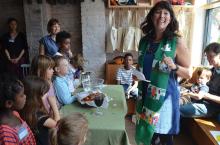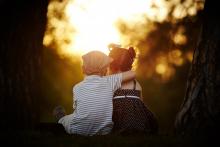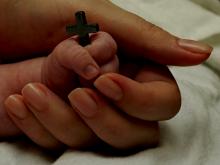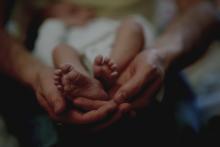Children

READERS OFTEN ASK US: How can I incorporate a hunger for justice into my child’s spiritual formation? How do we help the youngest members of the church understand the gospel’s call to love God and to love our neighbors as ourselves? Sojourners asked five Christian parents engaged in various forms of justice work to share their best tips for helping children put their faith into action. Here’s what they said. - The Editors
1. Look for Teachable Moments
by Kate Ott
MANY PARENTS FEEL unprepared to talk about sex or faith with their children. I was one of those parents until I realized age-appropriate sexuality information could empower my children and keep them safe. I also realized that teaching my kids about sexuality meant more than talking about “sex.” After all, if I didn’t talk to my kids about how Christian values of love, justice, and mutuality guide the care of our bodies and our relationship choices, who would?
So rather than planning for a single “big talk” or waiting until I know all the answers, I practice parenting through teachable moments. For example, in our house we talk about how clothing choices and hygiene reflect our thankfulness for our bodies as part of God’s good creation (including remembering to brush teeth!). As a parent, when I take a picture of my kids, I ask them for permission before posting it on social media; this encourages thinking-before-posting and consent as an active yes. And when we’re watching TV or listening to a song in the car about attraction or a relationship, I ask questions like: How would you feel in that situation? Do you think that person values their body? Does that seem like a mutual decision/relationship? Is that kind of love balancing God, neighbor, and self? In the short conversation, I always say something like, “Being in a relationship takes a lot of work and requires communication, honesty, commitment, and mutuality.” This models how to use one’s values to assess relationship choices.

Last year, St. Lydia’s church in Brooklyn, N.Y., started a monthly service that lifts up children’s leadership and participation. They call it Waffle Church, and it’s messy on purpose. Olivia Whitener, an editorial assistant at Sojourners , interviewed Waffle Church minister Sarah McCaslin in January about the service that revolves around songs, stories, maple syrup, and the love of Jesus.
Sojourners: Why waffles?
Rev. Sarah McCaslin: Well, I prefer a savory brunch option, if given the choice. But “Omelet Church” just doesn’t have the same ring. The fact of the matter is: Who doesn’t love a waffle? They’re easy to make, they’re delicious. But the waffles aren’t as important as the idea of this meal we share around the table. It isn’t that we’re going to church and then will have waffles. When we sit around the table together and fellowship together, it’s an extension of communion.
What’s special about a Waffle Church service? The first time we did Waffle Church, I was standing at the table, and I do a rhetorical-question-style liturgy: “Look, we are gathered around this table, and we set it with our finest. This is not the Lutheran table, it’s not St. Lydia’s table, it’s not Waffle Church’s table. Whose table is this?” Then a 6-year-old shouts, “It’s the Lord’s table!” We couldn’t have planned it, and it was just amazing. Of course, now we have to do it because there’s always the kid who wants to shout “It’s the Lord’s table!” And so here’s a piece of the liturgy that has been fixed because the children will demand it. That kind of stuff is just happening all the time.
Are there ways other churches can incorporate a Waffle Church service into their ministries? I think it’s about creating a physical space that can accommodate the needs of children. The music is the other major piece of it. At St. Lydia’s, we adhere to the paperless-music singing tradition, where all of the songs are taught. So there’s no hymnal, no lyrics to be read—those things tend to privilege literacy. This way, children and adults can participate in the music each and every week.

DURING ALL THE Sunday mornings I spent in church as a child, I only cried once. After months of encouragement from my parents, I decided to go to our Catholic parish’s children’s liturgy (their version of Sunday school). I remember nothing else about that morning except that I stood in the corner crying while kind volunteers tried to calm me down with a few cookies. I never went to children’s liturgy again, and I’m thankful the experience didn’t leave me scarred for life, unable to eat another cookie.
My dislike of children’s liturgy wasn’t about what it was; it had to do with what it wasn’t. I grew up watching Mass unfold from the front pew, where I could be as close to the action as possible. Going to the basement meant that I had to give up the beauty, wonder, and fascination I experienced during church services.
It’s been more than 25 years since I lost my composure on that fateful Sunday, and my dissatisfaction with children’s liturgy is now echoed by ministers, Christian educators, and parents who realize the importance of including children in corporate worship. But as I see it, including children in corporate worship isn’t a matter of choice or changing trends; it’s a matter of justice.
“When your children ask you ...”
Practices for including children in worship are far from new. Children’s ministry leaders refer to Deuteronomy 6 so often that memorizing this passage might as well be a prerequisite for working with kids in churches! Many interpretations of this chapter focus on the first few verses—“Keep these words that I am commanding you today in your heart. Recite them to your children ...”—and emphasize the importance of teaching God’s commandments to children in all times and places. Yet a crucial point in this text appears in verse 20, which begins, “When your children ask you ...”

Working out our salvation and instilling a life of faith in our children isn’t about executing rituals with precision. It isn’t about teaching them to pray eloquently, or to get them to obey without question. It isn’t to give them the letter of the law so they can judge the world with a heavy-handed measuring stick. It is to form and shape their identities into one oriented towards justice and beauty in our world. It is to open their eyes to the realities of oppression and suffering.
In a world where there isn’t enough stickers for everyone in the school, how can we invite the children into the struggle for equality? How do we teach that Jesus wants to give stickers to everyone? If it isn’t good news for everybody, it isn’t good news for anybody. How can we place sticker-sharing to such high priority that it becomes embedded in our children’s psyche, so that kindness is instinctual?
May our children then parallel secular peers in generosity and love. More importantly, may the children of our generation inspire us, the adults, toward greater mercies for the suffering. May love win, justice roll, and the moral arc bend toward the right direction, so we can hold witness to the transformation of communities for good.

In every moment, we are every age we have ever been, according to psychologist Carl Rogers. For me, this means our bodies are like a bus riding down the highway of life, and the passengers are who we have been at every age. As we travel through life, some things we see, hear, and experience evoke feelings of great joy, love, and calm — or trigger tremendous anxiety, pain, and fear — from different past experiences.
When children are treated like they are not important, told they not smart enough or good enough, valued more for their accomplishments than for the unique individuals they are, treated like they only have value if they have money, or abused emotionally, physically, or sexually, the impact of those feelings never goes away. Those feelings continue to ride on the bus.
Because the child within us never goes away, the impacts of childhood abuse and neglect are long-term unless there is meaningful intervention.

The phrase has captivated my imagination for some time now, as I seek joy in the midst of a world crying out in pain. In a nation of mass shootings and executions, in a world devastated by war crimes and the crime of war, where working for peace means learning the depths and pervasiveness of violence, despair threatens to seep in through the air I breathe. Hope often evades my grasp, and fear like a weight drags down my every movement.
But when I find myself in a morass of bitterness, my soul gets a jolt of energy from my laughing toddler, or the accidentally insightful comment from my precocious 6-year-old, or the warm hand of my husband on my shoulder. I savor the comfort of these gestures and let them lift me out of my cynicism. And as the tears clouding my vision disperse, I remind myself that joy, too, permeates the world and can be found by those with eyes to see it.

The Great War that engulfed Europe from 1914-1918 was a bitter disappointment for the peace movement. As the 19th century came to a close, the promise of progress that accompanied Darwin’s discovery of the evolution of life on earth seemed to put peace within our grasp. “Progress” was the popular byword and always meant a movement toward something better. It was the age of invention and industrialization. Human beings were overflowing with strategies to improve the lives of the poor, the uneducated, the working class, and the least and the last among us. The women’s rights movement was flourishing as well, and Dr. Maria Montessori, the first woman in Italy to receive a medical degree (1896) was an outspoken and popular representative of the cause. But 1914 dashed all that hope.
Many are the disappointments in the world today, as well, if your goal is peace. We are witnessing the greatest number of people displaced by violence and war since the second Great War in Europe. Even so, much progress has also been made by movements advocating for the rights of groups excluded from privilege and power. Women, labor, the disabled, LGBTQ, the poor, and the sick have all witnessed their rights expand. And yet war continues. We are living in the best of times and the worst of times, it seems — a paradox that causes many of us to careen between hope and despair, unsure of how to move beyond the motion sickness.

Robert Putnam’s new book, Our Kids: The Crisis in the American Dream, laments the decline in social capital (how we are connected to others and care for them) with its devastating impact on poor children today. Past generations of poor children often had more opportunities because they benefited from connections with churches, teachers, coaches, and other mentors who supported them. Putnam, a respected Harvard sociologist, documents how too many children are missing these caring adults in their lives today. He offers "purple solutions" to the growing "opportunity gap" and poverty that includes support by all for public schools.
Many churches witness to their concern for school children with a "Blessing of the Backpacks" service. Some churches invite the children in the congregation to bring their own backpacks for a blessing before a new school year begins. This is a way to acknowledge that school is a common yet very important part of our children’s lives. Other churches collect school supplies for children in need, assemble the donated supplies in backpacks, and bring them to church for a blessing in worship.
The tune of the following new hymn is the same Gaelic melody used for "Morning Has Broken," and it seems appropriate to sing a joyful "morning" tune as children, parents, and teachers start to get up earlier in the mornings to head off to school.

Here’s the thing: I live in a country that is predominantly Buddhist. Here, little kids are taught to hold incense and kneel and bow at ancestor tablets and a variety of gods. Do you know how cute it is to see a little kid praying with pure devotion to a Buddhist god? It is JUST AS CUTE as the blonde headed little girl singing Jesus Loves Me.
A child’s faith is not a testimony of the power of God to evangelize them. It demonstrates how malleable and impressionable children are to the faith values exposed to them at a young age. Children must trust wholeheartedly in order to survive. Their dependence on adults undergirds their entire worldview. Like it or not, as parents we are entrusted with this enormous responsibility to build the structures of faith in which our children will inevitably live fully into, especially when they are little.
Because of this drastic inequality of power between adults and our dependent children, we must take tender care to wield our tremendous spiritual influence on them in a way that is respectful of their autonomy, that listens to their concerns, that empowers them to grow into wholeness, and to ultimately make their own faith choices. We must always be aware of the power differential even as we act as the portal through which they come to know God.

We think it's wrong for a woman, much less a mother, to be angry. And so when anger inevitably, righteously, hits us — with its cousin fatigue and its brother frustration — we don't know what to do except to bury it beneath a smile that gets thinner and weaker as the day winds on.
We all get angry, though. It is a function of being human, and I daresay without anger we would never have won women the right to vote, school desegregation, or any other host of advances that came about when people got righteously angry and unleashed the power of justice and the Holy Spirit.
So be angry when you are angry. The Bible says so. Do not be ashamed to say, in the moment, "This is not right. I'm angry."

What happens when the heart of God is broken?
What happens when, in spite of our best efforts, we are overcome by human frailty, we are assaulted by the reality of the sins of humankind, and it appears there is nothing we can do that will overcome the tragic pain of our fractured lives? Such are the questions that come upon us when we read of the tortured life of King David, the pain and agony of his personal sin, and the tragedy that befell the life of Absalom, his beloved son.

After five days in the hospital, filled with overwhelming joy, paralyzing fear, and complete exhaustion in the wake of the birth of our twins, I finally found a moment to walk outside the florescent lights and sit under the bright moon. Sitting on a small patch of grass outside the hospital doors, the reality of being a father to four kids finally hit me. I was both overwhelmed and overjoyed by the gift and responsibility of raising four kids in a world so desperately in need of mustard seeds of hope that one day blossom into healing and beauty.
So as I sit in relative comfort and begin to dream big dreams for my kids, I am struck by the reality that most fathers around the globe are forced to welcome their kids into a world where there is no "ladder" to climb because it has been knocked out from under them by broken systems that are breaking people. A world where many kids are born into families fleeing violent persecution and being nursed on the trauma of war in battered refugee camps — places where the thought of hope is a distant second to simply fighting to survive. A world where one’s value is more closely associated with gender (male) than with the beautiful uniqueness inherent in every new life.
But this is also a world pregnant with possibilities. A world where former enemies move beyond their past, share tables, and begin to imagine a future together. A world where the blossoms of new life begin to sprout in the shadowy corners of forgotten neighborhoods. A world where the diversity of God’s kingdom begins to awaken our eyes and hearts to the new world God is making.
It is in this world — a world both beautiful and broken — that I offer this prayer over my four kids.

There’s a photo he carries for long journeys
like this one, for trips on loaded market lorries
where the passengers take their seat, perching
on top of cargo, or sitting on crude benches
inside the buses coming from Sudan with names
like “Best of Luck” or “Mr. Good Looking.”

The faces of children show us just how foreign to human nature violence actually is. Children shrink from violence. They withdraw inside of themselves, and the face they turn outward to the world is one stripped of their personalities. They lose their affect, are unable to smile or respond to overtures from others. I suppose if you think that joyless, lifeless, blank stares are “normal,” then violence can be thought of as essential to normal human functioning. But if you think that children like this are abnormal — in other words, if you think that violence has prevented them from developing normally — then it’s fair to conclude that violence is anathema to human life and therefore cannot be part of our DNA. Violent behavior must be contingent, just one possibility among others in the vast repertoire of human behaviors. One we can opt for or opt out of as we choose. A choice that a careful study of mimetic theory forces us to face.

Unless you change and become like children, you will not enter the kingdom heaven. (Matt. 18:3)
Jesus spoke these words as a response to a question from his disciples. Which of us, they demanded to know, was the greatest in the kingdom of heaven. Jesus must have been struck by the contrast between his rivalrous disciples, so-called friends bickering and vying for attention, and the children who were playing nearby. He could have said, “I am, you silly gooses! Don’t compete with me – follow me!” But he had tried words before to no avail. So he summoned the children to show that greatness in the kingdom means playing joyfully in the moment with a humility that is heedless of rank or position. Only such as these, he explained, are able to know me and follow me.

IMMANUEL KANT has been on my mind as I’ve followed the national response to recent measles outbreaks. Kant, a German philosopher, emphasized the danger of a temptation we are all vulnerable to—the temptation to make special exceptions for ourselves. The person who acts against principles that she thinks others ought to follow becomes a kind of moral “free-rider,” attempting to benefit from public moral order without contributing to it.
The spread of disease among the intentionally unvaccinated highlights the free-rider problem faced by parents who seek exemption from vaccination.
Some people believe that leaving their children unvaccinated (or under-vaccinated) minimizes their children’s health risks. If everyone around them has been vaccinated, their risk of infection is indeed low. But when too many people decide to forego vaccination, “herd immunity” is lost and disease outbreaks occur.

WHEN YOU WORK for a Christian justice organization, it’s hard to complain about your petty personal problems. Dishwasher leaving spots on the glassware at home? Don’t mention it in the office or you get called out for a “First World problem.” Not happy with your cable company? “Dude, First World problem!” retorts a colleague, pouring coffee into his Amnesty International mug before a meeting on income inequality.
I work with people who have traveled the world working for peace and freedom, who have spent time in jail for their beliefs, but who show no sympathy when L.L. Bean messes up my order. (I purchased the medium winter pullover from their activewear collection, but they sent me a small. And it pinches when I lift my arms to pray during chapel.)
In short, my peers are saints working for a better world. And fortunately for them, they don’t have to look outside the office to see what’s wrong with that world, for I walk among them. I am he (or maybe him), the self-centered manchild whose personal preoccupations give a counterbalance to the righteous intentions of my colleagues. It’s a dirty job, but somebody’s got to do it.
And that somebody needs new kitchen cabinets.

The entirely preventable California measles outbreak has now sickened more than 70 people. With perhaps hundreds more exposed, the outbreak will likely continue.
As the disease spreads, experts will debate how we respond and what to do about the anti-vaccine movement that’s partly to blame for this mess. Likely, all we’ll agree on is better outreach to parents.
That’s not enough. Parents who do not vaccinate their children should go to jail.
In the year 2015, it is amazing that anyone in the United States contracts measles. The Centers for Disease Control and Prevention reports that the U.S. eliminated all native cases of measles in the year 2000. New cases generally occurred only among unvaccinated foreigners. Today, however, because of ignorant “anti-vaxxers,” the disease is staging a comeback.
Anti-vaxxers often claim the right not to put “poison” in their children’s bodies. That is ludicrous. A mountain of data has demonstrated that vaccines are safe and effective. Insisting otherwise is akin to believing that the moon landing was faked.
A more serious objection is that, like birth control, those with religious objections should be exempted. But, let’s remember that civil rights go both ways.

In a few days, Americans will gather across the country to watch the Super Bowl.
But what many of them don’t know is what happens outside of the stadium—a seedy underworld that profits off the sale of American children.
Every year, approximately 100,000 children are forced into prostitution in the United States—and many are illegally “bused in” to locations hosting major sporting events like the Super Bowl. Once the game is over, victims are relocated to the next profitable event.
The trafficking of our kids is not a game.
I can tell you firsthand that homeless children—desperate for food, shelter, and comfort—are the biggest victims of this horrific industry. At Covenant House, we’ve seen too many of these innocent children come through our doors.
I can also tell you that no homeless kid sells his or her body by choice. In a survey we conducted with Fordham University, almost 25 percent of homeless kids were either victims of trafficking or felt they needed to trade sex in order to survive.
ALL of them greatly regretted having to trade their bodies—a trauma that can haunt them for the rest of their lives.
We are doing everything we can to help these victims, as well as ensure that homeless kids who are at risk of becoming victims never fall prey to this vile industry.

Everyone who desires to follow Jesus’ command to love can pour that love into their own communities, where thousands of children languish in foster care, are legally tangled in the juvenile system, and are raising themselves with no strong adults to guide them forward.
These children in our communities are vulnerable to human trafficking unless each of us does something about it. Right here at home.
In Matthew 5, Jesus tells us to love our enemies. We should love even the unlovable, especially the downtrodden, the forgotten. Don’t be afraid to love those that the world says aren’t worth it, the throwaways, the ones we too often pretend don’t exist.
Love big, love strong, love deep with compassion and bravery. Love those who spit in your face and curse you, the ones who break your heart over and over again. Your love may be the catalyst that keeps that one person from becoming a statistic.
Who will end slavery? You will. How will we end slavery? By God’s grace, through love and fortitude. Not in a faraway place but right here, at home.